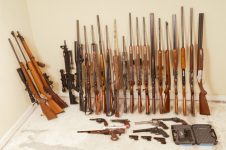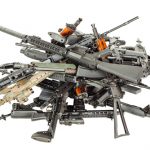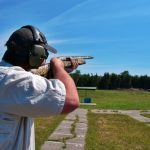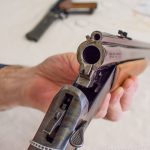Firearm Amnesty: Over 13,000 Weapons Surrendered Across NSW

Australians have surrendered more than 400 firearms a day since July, as part of the latest national gun amnesty.
The federal government implemented the scheme this year, promising tough penalties for anyone who fails to surrender illegal firearms.
Police say the results have been “astounding”– with about 26,000 firearms handed-in so far, and NSW topping the list.
The number of weapons surrendered by jurisdiction is:
NSW: 13,468
QLD: 7,000
VIC: 2,150
SA: 1,338
TAS: 1,136
WA: 521
ACT: 264
NT: 122
Amidst concerns about terrorism and illegal guns circulating around Australia, the government invited people to hand in their illegal firearms voluntarily in much the same way as in the wake of the 1996 Port Arthur Massacre.
This time, the government says the tipping point was the Lindt Cafe seige of December 2014. Man Haron Monis was on bail for serious offences under the previous Bail Act. He posted threats on social media in the days prior to the siege, but the prosecution neglected to apply for his bail to be revoked, which it could have done at any time. That application would have been made under the new Bail Act, which had come into effect by that time.
Monis managed to get his hands on a firearm and travel into the Sydney CBD completely undetected, before mounting the fateful siege.
Following that event, the Tony Abbott-led government temporarily banned the Adler A110 shotgun.
In June this year, the government took its crackdown on firearms even further by announcing a new amnesty, with police estimating there are 260,000 illegal guns they want off the streets.
Australia has some of the toughest gun laws globally
Australia’s stringent gun ownership laws were introduced by the Howard Government and are believed to be some of the toughest in the world.
These laws have not been without controversy, with pro-gun lobbyists pointing out that gun ownership has a strong cultural history in Australia, particularly for people living on the land in remote and isolated areas.
They argue that strict gun laws leave law-abiding citizens without protection, concentrating firearms in the hands of criminals. They add that the vast majority of guns crimes are committed with illegal firearms, rather than those that are registered. They state that “guns don’t kill people, people kill people” and that in the hands of the right people, there is very little chance of guns being used to harm or kill.
On other side of the debate, those in favour of strict gun control laws argue that they make the community a safer place – reducing the likelihood of people using guns to commit both planned and impulsive crimes, decreasing the chance of gun theft whereby weapons end up in the wrong hands, and also reducing the potential for accidents. They point out that it is easier to commit heinous crimes such as mass murders using firearms, and believe strict laws can and have reduced the likelihood of such acts.
They point to nations such as the United States and argue that the prevalence of guns and a culture of gun ownership coincides with high levels of gun crime and accidents, and express concerns about the consequences of any dilution in gun ownership laws here.
Whatever the case may be, the federal government claims that illegal guns have again become a threat to the community’s safety, particularly in light of the increasing threat of terrorism.
Do gun amnesties actually work?
Many argue that while amnesties might minimise the risk of accidents or suicide, they are unlikely to impact the threat of intentional acts such as murder or terrorism because people who want to commit such crimes will find a way to obtain weapons regardless.
Hand in your gun, ‘no questions asked.’
The amnesty ends on the 30 September 2017. Until then, Australians who possession unregistered or unlicensed firearms can hand them in, anonymously, and with no questions asked.
Outside of the amnesty period, having an unregistered firearm is punishable by up to 14 years’ imprisonment.
As a result of the tough penalties, people have even been surrendering rare and vintage guns.
One man in Queensland surrendered guns he had collected over 30 years. Some of the more disturbing finds include machine guns and a homemade sub-machine gun handed in anonymously in Sydney, and also a hand grenade.
Other surrendered weapons include a shotgun from the Vietnam War, a luger pistol from World War I and a Smith and Wesson .455 revolver from World War II.








